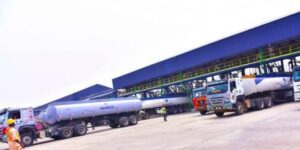Mining sector vital to national development plan — VP
The Vice President, Yemi Osinbajo has revealed that the mining sector is a vital part of Federal Government’s recent National Development Plan 2021-2025.
Osinbajo’s Spokesman, Laolu Akande, in a statement on Tuesday in Abuja, said the Vice President delivered a virtual remark at the opening of the 5th Annual Nigeria Mining Week Discourse Series.
The theme of the discourse is, “Top Seven Reasons to Invest in Nigeria’s Mining Sector.”
“It is significant that within the space of a year, we have recorded a 26.7 per cent increase in revenue generation from 2019 to 2020.
“But while this is encouraging, we recognise that there is still a lot of work to be done.
“That is why this forum is so important; we are privileged to have in attendance, so many distinguished experts and resource persons that deeply understand governance vis-à-vis the Mining Sector in Nigeria.”
He highlighted the inflow of notable investments already recorded in the sector.
Osinbajo said that the inflow was early evidence that the Federal Government’s framework was on the right track.
“These investments include Thor Exploration Limited’s Segilola Gold Mine in Osun State, with an initial production capacity of 80,000 ounces of gold annually, representing the first large-scale gold mine in Nigeria.
“In June last year, I also had the privilege of commissioning the Dukia Gold & Precious Metals Refinery (DGPMR) Project.
“The company set out to be a foremost indigenous refiner and trader of gold and other precious metals. Its potential impact on the gold sector is nothing short of revolutionary.
“By providing offtake opportunities through the establishment of Precious Metals Buying Centres, it serves as a spur for more small and medium scale mining investment.
“Its refinery symbolizes its focus on value addition in the gold and precious metals industry in Nigeria and West Africa.
“A similarly remarkable investment is the integrated Iron Ore Mining and Processing Plant set up by African Natural Resources and Mines Limited (ANRML) in Kaduna.
“It has an initial production capacity of 4.704 million tons of iron per annum and will scale up to 5.88 million tons per annum.”
He said that Nigeria was revitalising the mining sector with lessons learned from half a century of resource extraction.
According to him, the Federal Government recognises that it is not enough to seek investment merely for the sake of exploitation and extraction.
He said that the mining sector could help rewrite a new chapter of economic growth for Nigeria.
“Concurrently, there is an ongoing review of the Nigerian Minerals and Mining Act 2007, aimed at bringing legislation into conformity with global best practices, limiting the role of government to that of regulation, and creating the space for the private sector to maintain a more expansive presence in the sector.
“What will be evident to a potential investor is that we have built a robust framework for the mining sector, line by line.
“In 2016, the Ministry of Mines and Steel Development, in collaboration with industry stakeholders, produced a clear Roadmap for the growth and development of the Nigerian Mining Sector Industry.
“In pursuit of the goals set forth in the roadmap, government initiated an ambitious reform regime in the sector, the flagship of which is the National Integrated Mineral Exploration Programme (NIMEP).
“(It is) designed to rapidly generate geological data with the aim of de-risking the sector and attracting high calibre investments.”
The Nigeria Mining Week is organised by the Miners Association of Nigeria (MAN) in collaboration with the private sector and is supported by the Ministry of Mines and Steel Development.



